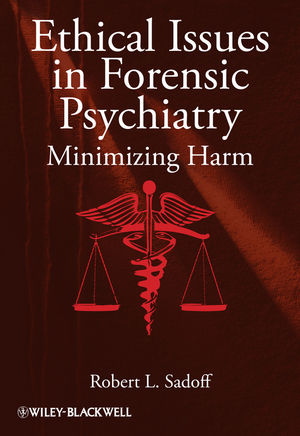Ethical Issues in Forensic Psychiatry: Minimizing HarmISBN: 978-0-470-67013-2
Hardcover
256 pages
February 2011
 |
||||||
Robert Sadoff addresses the long-term harm that can be either avoided or minimized through careful planning and application of ethical principles. He is not advocating that the harm can be totally eliminated, because that is impossible in the adversarial system in which forensic psychiatrists work. However, there are means by which harm may be minimized if care is taken during the assessment, the report writing, and the testimony phase of the proceedings. The book develops the scope of forensic psychiatry from the standpoint of administrative, civil and criminal cases. It presents the practical issues involved in conducting forensic psychiatric assessments under various conditions plus special considerations, such as bias, minimizing harm, developing a therapeutic approach, and elaborating on various vulnerable individuals who are frequently examined in forensic cases. These include juveniles, mentally retarded, autistic, sexual assault victims, the elderly, the organically damaged, the psychotic, and mentally disabled prisoners. Immigrants are covered in a chapter by Solange Margery Bertoglia. The ethical issues in conducting forensic psychiatric examinations and presenting psychiatric testimony in court are examined and discussed. Cases illustrating the difficulties involved punctuate the presentation. The book closes with a fascinating account of the legal perspective by Donna Vanderpool.
In summary, this book illustrates the ethical and practical issues that affect forensic psychiatric practice. The question is not what we do, but how we do it, and which standards, ethical guidelines and personal values contribute to the total picture. Despite the fact that we cannot always adhere to the doctrine of "primum non nocere," we can minimize the harm caused inherently by the adversarial system in which we participate.
Praise for Ethical Issues in Forensic Psychiatry
"One of the founding giants of the forensic psychiatric field has written here far more than a "mere" ethics textbook. Instead, this compendium serves multiple purposes: it is a valuable primer on forensic techniques of examination and testimony, a model of best forensic practices, and an instruction on the most appropriately civilized way in which to conduct oneself as a forensic psychiatrist.
The success of these multiple accomplishments clearly derives
from characteristics of the author. In both sage advice to
practitioners and in many revealing case examples, Dr. Sadoff
displays the tact, good manners and sensitivity of a consummate
gentleman – a term not always associated with the hurly-burly
of courtroom work. The book's primary focus on avoiding harm to all
the parties involved in the work places it on the moral high ground
of the legal system in which participating clinicians must find a
place."
Thomas G. Gutheil, MD, Professor of Psychiatry and
Co-Founder, Program in Psychiatry and the Law, Beth Israel
Deaconess Medical Center, Harvard Medical School



